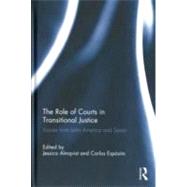- ISBN: 9780415601375 | 0415601371
- Cover: Hardcover
- Copyright: 11/16/2011
This book examines the role of courts in times of transition. The book focuses on judicial experiences from the Iberoamerican region, in particular Argentina, Chile, Colombia, Spain and Guatemala, exploring the extent to which national courts have been able to shoulder the task of investigating and prosecuting grave crimes such as genocide, crimes against humanity and war crimes, committed in the context of a previous repressive rule or current conflict.The volume contains contributions from judges, prosecutors, and scholarly experts in the region. It offers first-hand experiences and expert findings on crucial issues surrounding the role of the courts including: balancing principles of justice and fundamental concerns about legality and non-retroactivity; security problems facing courts in conflict situations; the immense case load; the role of regional and international courts in aiding their national counterparts; and the cooperation between different and overlapping jurisdictional competences. The book also draws attention to the way in which regional and international courts have come to contribute to the initiation of national judicial processes, above all, through international standard-setting and pressure. It goes on to articulate a philosophical critique of the dominant understandings of transitional justice because it has not paid sufficient attention to criminal justice. In this context, the volume outlines an alternative conceptualisation that seems better equipped to both explain the recent developments towards the 'judicialization' of transitional justice politics while, at the same time, also insisting on the continued need for caution and critical reflection on the role of courts in times of transition.






